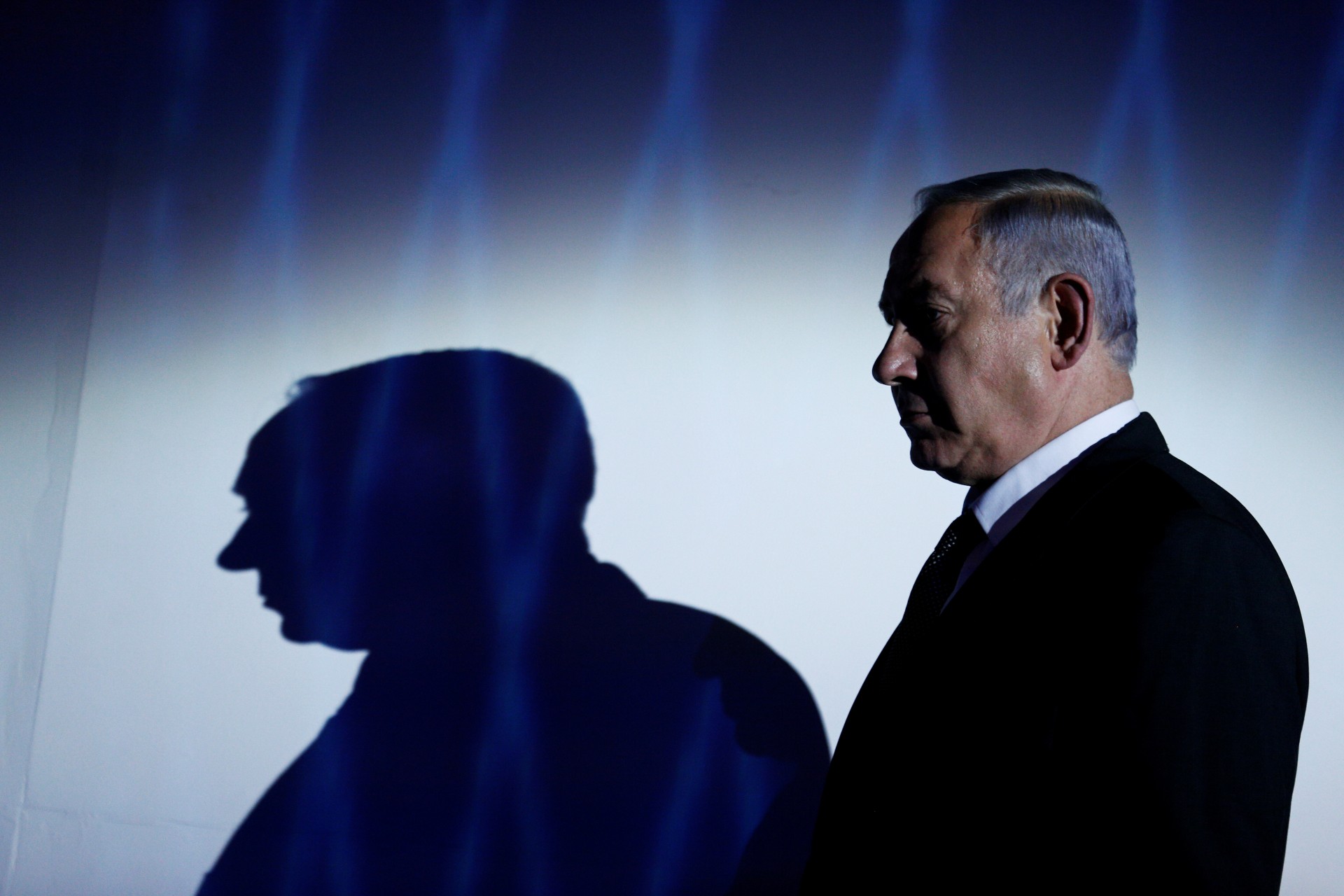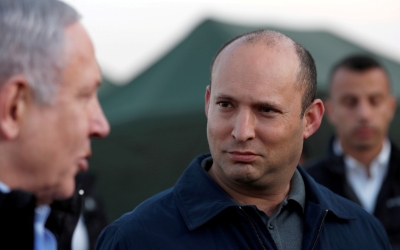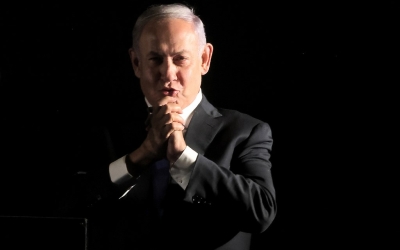Why Israel's collapsed 'coalition of change' was no longer worth saving
Save the date: 25 October 2022. This is – for now – the date set for elections in Israel, the fifth round in three and a half years.
It’s certainly not a sign of a healthy democracy in a country that prides itself on being “the only democracy in the Middle East”; it feels more like Covid-19 infection numbers that come and go in never-ending waves.
This is not necessarily the end of it: according to the newest poll conducted a few hours after Prime Minister Naftali Bennett announced his unexpected decision to dissolve parliament - making foreign minister and alternate PM, Yair Lapid, the interim premier of the transition government for the coming four months - a sixth round of elections is still an option.
Though the Likud party - led by former prime minister Benjamin Netanyahu - could get 36 seats according to the poll (seven more than what they have now), the right-wing opposition bloc will likely get only 59 seats, still two short of the 61 needed to form a valid coalition.
That leaves room for another option, now hastily discussed between closed doors: the formation of an alternative government with no need to dissolve parliament, or the Knesset, and tear Israel apart in yet another vicious election campaign.
New MEE newsletter: Jerusalem Dispatch
Sign up to get the latest insights and analysis on Israel-Palestine, alongside Turkey Unpacked and other MEE newsletters
According to political sources close to Netanyahu, he feels strong enough to opt for elections.
On the coalition's side, in a radio interview the morning after, right-winger Gideon Saar - the current minister of justice and former ally of the Likud leader - vowed again that he "will never sit with Netanyahu".
The New Hope party chief launched his campaign tweeting: "The goal of this elections is clear – to prevent Netanyahu’s return to power and the subjugation of state interests to his personal interest."
The chances for him to help Netanyahu close the gap to a majority are thus slim, but the option is still on the table. One thing is sure: one year and a week since its formation, the Bennett-Lapid "change government" is over.
All efforts by partners and supporters, including last Saturday's demonstration in support of saving this coalition, failed even before they took off.
But truth has to be told: this government was not really worth saving.
The looming Netanyahu
All the reasons for the formation of this unnatural construction nicknamed the “unity government” did not really justify its existence. The wish to oust Netanyahu - the “human incitement machine”, as Finance Minister Avigdor Lieberman called him - is a noble one, but the former prime minister has not really been ousted.
All recent decisions made by the coalition were motivated by the fear of Netanyahu’s return. All the while, the former leader runs a campaign of fake news, hate and fear of a government dominated by terrorists - meaning Mansour Abbas and his United Arab List (also known as the Raam party), which represents Palestinian citizens of Israel.
Even more importantly, the ideological foundations of the coalition have proved to be unsound. It came together on the assumption that the right and left, Jews and Palestinians, could cooperate in the name of a common good, dealing with civil - not divisive - issues only. Wrong. They cannot.
There is no real common ground in real Israel and every civil decision is steeped in national questions and right-left schisms. Occupation is still here. Settlements are still here. Mutual hate and fear are still here, more so now than ever.
The members of the “change government”, in the one year it served - and unlike most of its predecessors - have actually worked. Still, they brought no real change, just a change in style; a more polite way of doing the same thing.
What is the real difference between opposition member of parliament MP Itamar Ben-Gvir, who openly called to “expel the Arab enemy”, and coalition deputy minister Matan Kahana, who recently wished he had a magic button that could peacefully send all Palestinian citizens of Israel to Switzerland?
The administration of Bennett (head of right-wing party Yamina) and Lapid (head of the centrist Yesh Atid) ended up being a right-wing government, with almost no impact made by a shrinking left dedicated to the mission of keeping Netanyahu out of office.
While serving as gatekeepers to that mission, the Homesh settlement - evacuated by then-prime minister Ariel Sharon - is populated again; and more than 1,000 Palestinians are about to be expelled from their homes in Masafer Yatta in the south Hebron hills in order to make room for a military training zone.
Just this week, the coalition for change decided to back an opposition bill to prioritise, within civil service jobs, minority candidates who completed military or alternative service. Meaning - in Israeli terms - the “good Arabs”.
The bill was bound to lead to a clash with the Palestinian partners in the coalition. “We don’t work for the Raam party,” responded Housing Minister Zeev Elkin (New Hope), when asked about that.
Change? Not really.
Theatre of the absurd
Confused? There is more. Are you familiar with the name Nir Orbach? Neither were most Israelis two weeks ago. Orbach is an MP from Bennett’s Yamina party, one of the prime minister’s closest allies in politics.
He is also one of the five party members in the coalition, after MP Idit Silman (Yamina), who resigned in protest from it in April, shifting the balance of power between coalition and opposition and slowly leading the government to where it is today. Both have automatically become Likud darlings.
Orbach, revered son of the Religious Zionist camp, announced a week ago that he was no longer a member of the coalition, claiming that “extremist, anti-Zionist elements”, such as Arab MPs Ghaida Rinawie Zoabi (Meretz) and Mazen Ghanaim (Raam), were holding the grouping hostage.
The incident that triggered Orbach’s move sums up the absurdity of this coalition. On 6 June, the Knesset voted on the renewal of emergency regulations, which ensures Israeli settlers in the West Bank have civilian rights while Palestinians are subjected to military rule. This procedure has been ongoing for more than 50 years, since Israel’s occupation of the West Bank in 1967 and the beginning of the settlement movement.
As the occupation has become normalised for most Israelis, so has the renewal of these emergency laws, which takes place automatically every five years. It is a banal act that serves as a meaningful reminder of the abnormality of the settlement project.
Even the settlers’ right to vote in Israeli elections as non-citizens is questionable without this law. The emergency regulations make clear distinctions between Palestinian residents of the West Bank and Jewish residents of the West Bank - in other words, apartheid law.
This year, what was supposed to be an automatic renewal of 50 years of abnormality turned into a theatre of the absurd: the opposition, led by settler parties like Likud and Bezalel Smotrich’s Religious Zionist party, voted against the renewal, just to show their distrust in the government. Together with the MPs of the Arab Joint List, they gathered 58 votes against.
However, the real story came from inside the coalition, as both Renawie Zoabi from Meretz and Mazen Ghanaim from the United Arab List voted against the bill. The coalition lost 52-58. All hell broke loose. The coalition’s right-wingers felt betrayed not by their right-wing opposition, with whom they share an ideology, but by their Palestinian counterparts. In the end, the dissolution of parliament will allow the bill to be extended automatically.
Still, something good came out of it. Occupation, settlements and the abnormality of it all, so carefully hidden by all partners - suddenly surfaced. In that sense, it was an important decisive moment in many respects.
Nir Orbach vocally announced that the “experiment of a coalition with the Arabs failed”, and since then, he has been conducting talks with Likud as to his political future. “Bennett, go home”, Likud responded in a short message.
In a way, they were right. That final blow triggered the end of this coalition.
Bibi and Ben-Gvir
On a much deeper level, the unauthenticity of this pragmatic partnership with no deep social and political roots caused more bad than good.
A year ago, majority of Israeli Jews were in favour of Jewish-Arab partnership in coalition as a notion, according to a poll by Panels Politics Research. Following a year of Raam being in the coalition, 69 percent no longer want an Arab party in the government.
The first thing Likud MPs said when Bennett dissolved the government on Monday was: no Arabs this time. In a special TV panel on Channel 12, vocal Likud MP Mickey Zohar proudly announced: “We cannot run a state founded by Jews for the Jews with anti-Zionist partners.”
Abbas, seated next to him, asked “and what about partnership with Itamar Ben Gvir? He is more dangerous.” Zohar brushed him off impatiently "that’s completely different."
On a much deeper level – the unauthenticity of this pragmatic partnership with no deep social and political roots caused more bad than good
True. The racist and former Kahanist Ben-Gvir, who undermines the very foundations of Israeli democracy, is indeed different. He is Jewish.
This short exchange marks the lines of the future electoral campaigns. The key issue is going to be again – "Bibi or not Bibi”. However, there is more to come. Likud is going to refer to the “dangerous government led by Bennett–Lapid–Abbas and the Muslim Brothers”. The coalition partners will make the equation "Bibi and Ben-Gvir."
Rightfully so, since Netanyahu singlehandedly brought Ben-Gvir to the Knesset to fortify his camp prior to the 2021 fourth round of elections, giving him immense power. In all recent polls, Ben-Gvir's Religious Zionist alliance (headed by Bezalel Smotrich) will get nine or 10 seats, many of them from the younger generation voters of the Orthodox parties. He is indeed the new symbolic face of Israel.
A short reminder: in the late 1990s, it was Avigdor Lieberman - a secular right-wing former minister of defence - who was defined by moderate Likud leaders as "racist" and a danger to democracy. The left now embraces the very same Lieberman in its attempt to keep Netanyahu out of office. This is one way to show how Israel changed.
Four months of eternity
What next in the immediate future? Lapid, the PM of the transition government, with 20 seats in all recent polls, has a good starting point to challenge the far-right camp. He is vulnerable, however, to one severe weakness in Israeli political tradition: he has no military experience to show for.
This could be rectified if Gadi Eizenkot, former chief of staff of the Israeli military, joins his party as speculated. Lapid will be the beneficiary of such a move and the Labor party might be its victim.
Since both parties share a similar electorate, voters may prefer to vote for what will be then the ruling party (Yesh-Atid), partnered with Eizenkot, who is liked and respected.
Still, Labor stubbornly refuses to unite with Meretz, another left-wing party, now facing the threat of not meeting the electoral threshold, as polls suggest. As such, Lapid looks to become the left-wing marker of the changing political scene.
But on the other hand, four months until election day means eternity; it is not the time yet for speculations. With the ever-changing political scene in Israel, and all twists and turns of alliances and coalitions witnessed in the last three years, what 25 October will look like is anyone's guess.
This article is available in French on Middle East Eye French edition.
Middle East Eye delivers independent and unrivalled coverage and analysis of the Middle East, North Africa and beyond. To learn more about republishing this content and the associated fees, please fill out this form. More about MEE can be found here.







